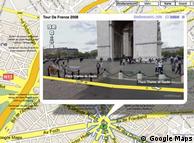Internet giant Google grounded its fleet of camera-equipped cars
in May, after it transpired that they had inadvertently been gathering
personal data from unsecured Wi-Fi networks.
Since then, the cars have been stripped of their wireless scanning
technology, which Google says means they are now fit to restart Street
View driving in Ireland, Norway, South Africa and Sweden. For the time
being.
 Bildunterschrift: Großansicht des Bildes mit der Bildunterschrift: On the move in Germany, a Street View car before they were grounded
Bildunterschrift: Großansicht des Bildes mit der Bildunterschrift: On the move in Germany, a Street View car before they were grounded
"We expect to add more countries in time," one of the company's vice
presidents, Brian McClendon, said in a blog, adding that Google was
aware that serious mistakes had been made in the past.
He said the cars, which have been cruising the world's streets taking
photos for Google's online mapping service for the past few
years, would no longer collect any Wi-Fi information at all.
McClendon insisted that they will now only collect photographs and 3D
imagery, essential for Street View, which he considers invaluable for
people looking for a hotel or restaurant or to check out a new home.
Not on German turf
But the snap-happy cars will remain conspicuously absent in Germany,
which is famed for its particularly strict data protection laws, adopted
after World War II in a bid to keep personal information out of the
public sphere.
In response to Google's erroneous Street View data collection system,
Berlin's upper house of parliament, the Bundesrat, has drawn up draft
legislation to further tighten data protection.
As it stands the California-based search engine is already obliged by
law to render faces and car license plates appearing in the photographs
unrecognizable before publication, and to withdraw pictues of
unconsenting people.
Too many demands?
But the new draft, which has yet to be passed by parliament, would go
a step further. The Bundesrat wants a provision of anonymity for the
facades of buildings if homeowners or tenants so desire.
 Bildunterschrift: Too recognizable for Germany?
Bildunterschrift: Too recognizable for Germany?
Companies such as Google, seeking to use street level images, would
be bound to contact the relevant data protection official three months
before any systematic filming was carried out. Failure to comply with
the new rules would result in fines of up to 300,000 euros ($377,00).
The proposed legislation is as controversial as the map service
itself, with President of Germany's Federal Association for Information
Technology, Telecommunications and New Media, August-Wilhelm Scheer,
calling it "political activism". He said Germany should consider the
direction it was taking.
"Germany should not become notorious for finding problems with new
technology," he said, adding that data protection should be geared
towards international standards.
Author: Tamsin Walker (AFP/dpa)
Editor: Mark Mattox
http://www.dw-world.de/dw/article/0,,5784204,00.html









